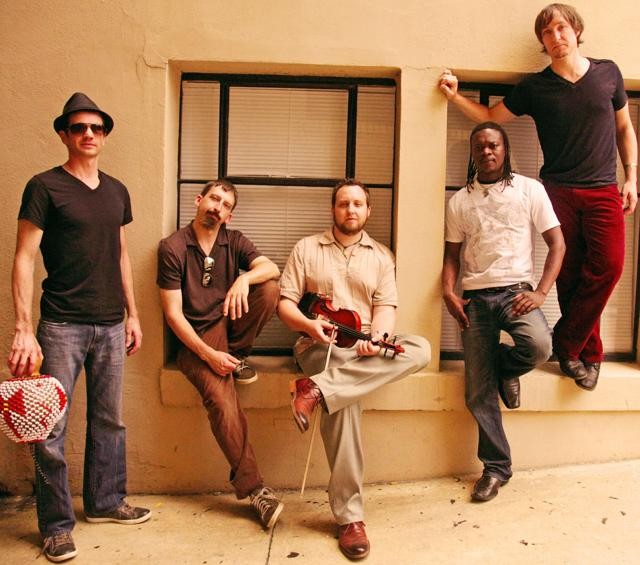Zansa is a group 33 generations in the making.
The Asheville-based Afropop band’s lead vocalist and djembe-player Adama Dembele comes from a long heritage of West African musicians. He was already fooling around with his family’s specialty, the djembe, in his native Ivory Coast when he was just 2 or 3 years old.
Partially because he started out so young and partially because of the pervasiveness of music in his family, Dembele soon became adept at playing the instrument.
“I remember when I was starting to be like age 8 or age 9, I started to know what I was doing with the music,” Dembele says. “When I was 13 years old, that’s when I started to perform with my brother. Before that I would just play at home, but now I’d play like performing.”
Despite Dembele’s vast lineage, Zansa’s sound draws its roots from zouglou, a newer genre of dance music born in the late ‘90s in the streets of the Ivory Coast that has since exploded into a slickly produced pop industry in Africa.
“The early zouglou stuff was basically just guys with djembes on the street, and they would create little dance parties,” says Ryan Reardon, Zansa’s bassist/vocalist. “And then, over the years, in the late 1990s and early 2000s, it developed into more of a produced music — club music kind of stuff.”
But although it invokes the same kind of dancehall spirit, Zansa’s music is far from strict zouglou. For one, the band is not as heavily produced for club consumption. For another, violinist Matt Williams contributes, in Reardon’s words, “hot, fiery” licks that are not as traditionally minded. Zansa’s music is truly more eclectic, drawing from various West African and American styles that are brought together by the zouglou dance beats.
The all-encompassing nature of their sound fits a band born of mutual cultural appreciation. Dembele first came to Asheville in 2007, having met some of its natives through his brothers, who often taught music to pilgrims from the States who would stay with them to learn about West African culture. He met Reardon through Afromotive, the bassist’s former Afropop group, and played some shows with them before the band split.
In 2010, Dembele and Reardon visited the Ivory Coast and were inspired to form a new group.
“The idea for the band really started when Adama and I were in the Ivory Coast together,” Reardon says. “I was there visiting with him and spending time with his family and learning some music from him and his brothers and just listening and absorbing everything around me.”
With a fresh goal in mind of enlivening Asheville with their zouglou-influenced beats, the two set out to flesh out their lineup.
“When we put the band together, we just had to find the right people who can handle this style of music,” Dembele says, “because this style of music is something really different than a lot of music that’s played here in Asheville and the United States.”
The right people turned out to be Patrick Fitzsimmons on electric guitar and vocals, Sean Mason on the drum kit and Williams spicing things up with the violin. Taking up the name Zansa (an Ivory Coast slang term meaning, appropriately, “blend”), the group took to writing the infectious and lively tunes that constitute their debut album, Djansa.
“It could be a celebration of a birth of a child, or a marriage or a lot of things that we celebrate,” Reardon says, “but ‘djansa’ is the idea of the feeling that goes into the party and what you give to the celebration, what you give to each other.”
And Zansa do not hold back on giving to the celebration. Although many of the songs are sung in French, Bambara (from Mali) and Baoule (from the Ivory Coast) in addition to English, the jubilant nature of the music speaks to Asheville audiences on a level that transcends language.
“I think even when the audience doesn’t understand the language, when you put the melody and you put something coming from voice, people can tell it’s not something bad you’re singing, because there is a love behind the voice, something deep behind the voice you’re putting out,” Dembele says. “I always like the way the audience listens to you first and appreciates before even they know what you mean in the song.”
Many of Dembele’s lyrics are based on African legends. Fittingly, he recently discovered that his ancestors were not just known for the djembe, but that they were also griots, traveling West African troubadours and storytellers that were tasked with keeping the region’s myths and history alive.
“Adama’s blood is griot blood as well — these traveling troubadours and storytellers that would pass along these stories,” Reardon says. “And that kind of ties in to this whole album that Zansa’s putting out with all these stories we’re telling on the album and in the songs. So, thinking about it that way, Adama is kind of a modern-day griot.”
who: Zansa w/ Arouna Diarra and DJ Minori
where: Isis Restaurant and Music Hall
when: Saturday, Sept. 7 (8 p.m. doors/9 p.m. show. $8/$10. 575-2737 or isisasheville.com)




Before you comment
The comments section is here to provide a platform for civil dialogue on the issues we face together as a local community. Xpress is committed to offering this platform for all voices, but when the tone of the discussion gets nasty or strays off topic, we believe many people choose not to participate. Xpress editors are determined to moderate comments to ensure a constructive interchange is maintained. All comments judged not to be in keeping with the spirit of civil discourse will be removed and repeat violators will be banned. See here for our terms of service. Thank you for being part of this effort to promote respectful discussion.